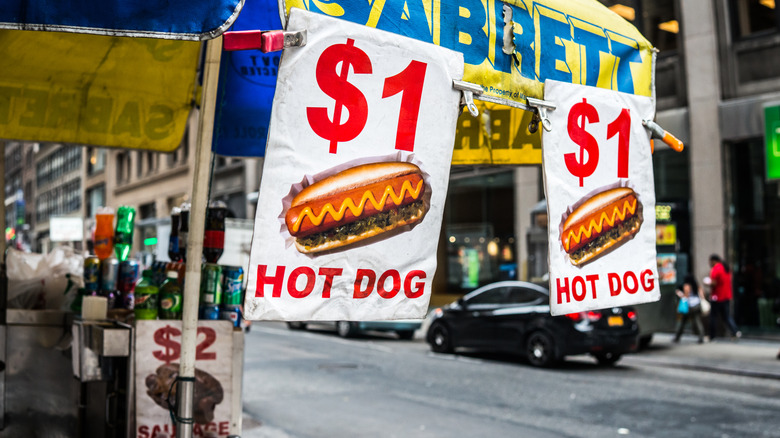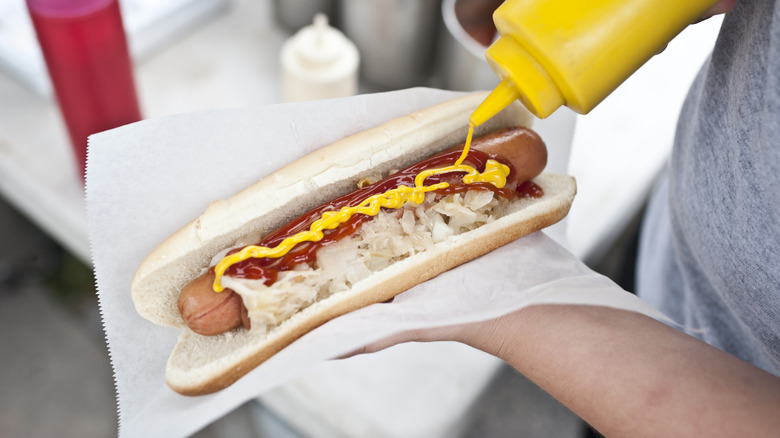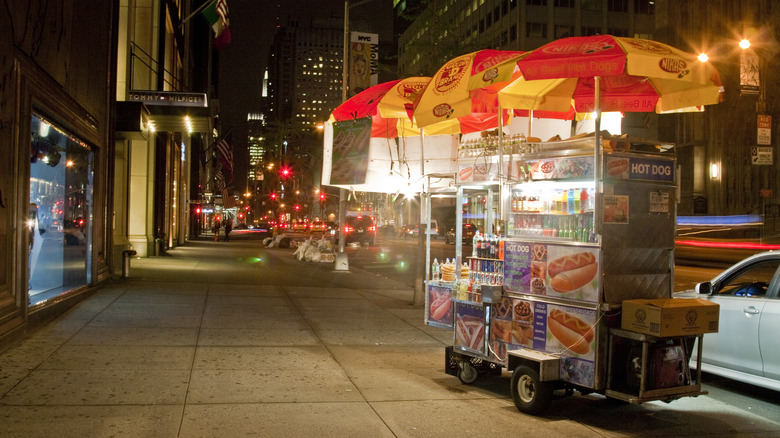Here's What A Dirty Water Hot Dog Actually Is
If you search for where to eat in New York City, you'll get recommendations for a wide range of options, from pricey steak and sushi spots to historical delis and pizza joints. Yet some would argue that the city's finest offering can't be found in any brick-and-mortar: It's out on the street, under a blue and yellow Sabrett umbrella. Hot dog carts — unpretentious, egalitarian, Americana incarnate — are just as much a part of the city's identity as yellow taxis and hating Boston. You can find all kinds of hot dogs around the city, but there's one style that epitomizes New York better than any other: the dirty water dog.
Generally speaking, any food described as "dirty" is going to be a hard sell. If you're not a New Yorker, the name probably has you thinking that vendors don't, for instance, change the water out of the vats they cook their hot dogs in. But rest easy, this isn't the case.
When it comes to NYC hot dogs, the colloquial phrase "dirty water" means that the water in the vat has been seasoned with various spices, giving it a dark and cloudy appearance. In doing so, the vendor imparts new levels of flavor to a pretty ubiquitous American food that can otherwise seem mundane. If you think you know what a hot dog tastes like, try a dirty water dog and discover something new.
What goes into dirty hot dog water?
Cooking a dirty water hot dog is more challenging than you'd think. New York City imposes strict regulations for street vendors, which state that hot foods must be stored at 140 degrees Fahrenheit or higher. The problem is that hot dogs can only stay in the water for 15-20 minutes before losing their texture. Vendors must perform a careful balancing act, transferring their hot dogs from cold storage to the vat at just the right time to ensure they always have plenty for sale while not overcooking any. There also is no set recipe for dirty water. Seasonings vary from cart to cart, but they typically include vinegar, red pepper flakes, cumin, and nutmeg. Onions and garlic powder are also very common; less common, though not unheard of, is the use of sauerkraut.
There are a couple of options when it comes to how a dirty water hot dog should be traditionally served. The New York-style frank doesn't adhere to very strict parameters like, say, the standard Chicago dog, but it's not a free-for-all, either. Assembly begins with a steamed bun and spicy brown mustard – traditionalists never use yellow mustard. From there, you can add sauerkraut, or even onion sauce, a New York specialty that consists of thickly-sliced onions simmered in tomato paste and spices. (Most vendors use a pre-made sauce from Sabrett.)
Can the dirty water hot dog keep up with the times?
The dirty water hot dog has long been the great equalizer of New York cuisine. It transcends demographics, economic classes, and even global power structures. When former mayor Michael Bloomberg welcomed U.K. Prime Minister David Cameron to town in 2010, the two power players ate street cart dogs. When Anthony Bourdain, who presided over one of the city's finest French restaurants, Brasserie Les Halles, was asked what visitors should eat in New York, he pulled no punches. "Dirty water hot dog," Bourdain answered, adding, "That's what we do." And yet, this icon of the people has come under threat in the 21st century.
In 2011, The New York Times investigated the decline of dirty water hot dog carts. When asked what drove them away from these vendors, New Yorkers spoke of wanting "better quality" and "more wholesome" food. The classic Sabrett sausage has somewhat fallen out of favor, replaced by all-natural brands and the rise in popularity of organic foods in general. Other interviewees cited concerns about the water being contaminated. (To wit, food carts and trucks are given health and food safety grades just like their NYC restaurant counterparts.)
While more carts are being built with grills and in time the dirty water dog may no longer be the standard, here's hoping, like New York City itself, it'll always be a mainstay.


